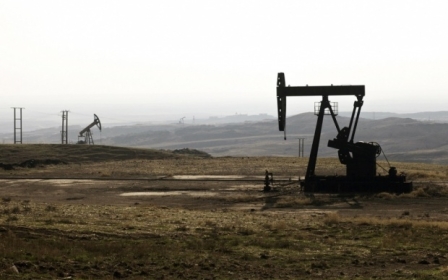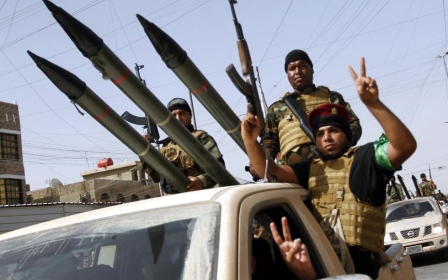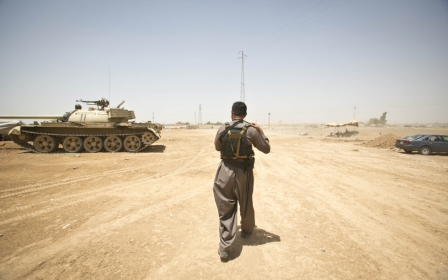Iraq's main oil refinery 'seized' as calls grow for unity government

Militants have reportedly taken control of Iraq’s primary oil refinery in Baiji, north of Baghdad, after 10 days of fierce battles over the station in Salah al-Din province which supplies a third of Iraq’s refined oil.
The ongoing battle for the site had already led to rationing of petrol in Iraq and street protests, reports the BBC.
According to a spokesperson for the militants, control of the complex will now be handed over to local tribespeople.
Prior to news of the Baiji refinery’s capture, Russia’s ambassador to the UN Vitaly Churkin called on the Security Council on Monday to guard against the illegal export of oil by non-state forces.
In the case of ISIL, he noted that “the militants’ ability to export oil especially rings an alarm because it enables them to engage in terrorism.”
On Monday evening Prime Minister Nuri al-Maliki announced a plan to honour the Iraqi army forces protecting the strategically-important site in Baiji, “in view of their heroic stance”.
However, news of the refinery’s capture late on Monday has been slow to trickle out in official media outlets.
Leading Iraqi news sites including al-Sumaria, Iraq al-Yawm, al-Nahar and al-Mashriq have no mention on Tuesday morning of the militant seizure of the refinery.
A website supportive of the militia who took over the oil refinery reports that there are “huge celebrations in the city to express joy at the heroic success of the revolutionaries”.
A video apparently showing residents celebrating after the city’s “liberation” was uploaded to YouTube.
Translation: Celebrations by Baiji families after the liberation of the refinery 23/6/14
Calls for ‘unity’
Prime Minister Maliki is facing growing calls for a major shake-up of the Iraqi political landscape and the formation of a consensus government, amid allegations that his sectarian policies have contributed to the current unrest.
US Secretary of State John Kerry visited the autonomous region of Iraqi Kurdistan on Tuesday morning, as part of a week-long tour of the region begun on Sunday.
After meeting with Maliki at the US embassy in Baghdad on Monday, Kerry announced that he had urged politicians to take swift action to form a new government, stressing that it was necessary to act as soon as possible.
US Vice-President Joe Biden and Turkish Prime Minister Tayyip Erdogan discussed the situation in a phone-call on Monday, agreeing on the necessity of forming a new unity government in Iraq, reports Turkish Anadolu Agency.
According to the agency, British Prime Minister David Cameron also spoke separately with Erdogan, expressing concern over the situation and stressing the need to find a political solution by forming a new consensus government.
Within Iraq, Kerry’s tour of the region and calls for the formation of a new government provoked criticism.
A representative from the ruling State of Law Coalition, Muhammad Saadun al-Sihud, poured scorn on US President Barak Obama for sending Secretary of State Kerry to visit “regional powers” to discuss the ongoing unrest in Iraq.
According to reports in news site al-Sumaria, Sihud explained that the move proves Obama’s inability to take the “brave” decision to launch military strikes in Iraq.
Iraqi state television station al-Iraqia showed rebuttals to criticism of Maliki’s government.
The broadcast of a poetry festival put on for Iraqi army soldiers on Tuesday morning included a long speech by an unnamed army official decrying calls for a new government.
“Iraqis chose the leaders of this state. Other countries must respect the will of the people.”
Mosul citizens manage ‘critical situation’
Meanwhile, residents of Iraq’s second-largest city are attempting to continue their daily lives after the withdrawal of the Iraqi army and the seizure of control by militants.
A source on the ground in the northern city of Mosul, who spoke on condition of anonymity, talked to MEE about the situation in the town, which has been outside government control since 10 June.
“There are many media reports saying that Mosul has returned to normal, and that everybody in the city accepts militant rule. This is not the case. The 3-4 million people of Mosul try to avoid any communication with the new fighters, trying to manage the critical situation.”
“About 80 percent of people stay in their homes. Queues at fuel stations are sometimes several kilometres long, with people waiting hours to buy just 20 litres of petrol.”
The source attacked both the militants now in control of Mosul and Prime Minister Maliki, whose army he accused of “protecting themselves but not the people.”
“These new militants are not true Muslims, just like the government and their army.”
The resident also played down the sectarian element to the struggle, which has seen leading Shiite cleric Ayatollah al-Sistani issue a rare fatwa calling on Iraqis to enlist as volunteers to counter militant advances.
“The media in Iraq focus on one dangerous element, saying that the civilians in Mosul support the fighters. This is despite the fact that army soldiers, who are mostly Shiite, were supported by Sunni families from Mosul when they tried to escape the militant advance. Sunni civilians hid Shiite soldiers in their houses and sent them back a few days later to safety in southern Iraq.”
There are reports in state-aligned news site al-Sumaria that militants have destroyed a religious shrine in Mosul.
The site quotes a source on the ground, who told them that the militant group’s legal body had issued orders for the destruction of “all religious shrines” in the mainly-Sunni city within the coming week.
New MEE newsletter: Jerusalem Dispatch
Sign up to get the latest insights and analysis on Israel-Palestine, alongside Turkey Unpacked and other MEE newsletters
Middle East Eye delivers independent and unrivalled coverage and analysis of the Middle East, North Africa and beyond. To learn more about republishing this content and the associated fees, please fill out this form. More about MEE can be found here.




